vatican
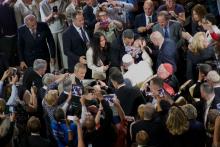
“We do not remember days,” the Italian poet Cesare Pavese said, “we remember moments.”
Pavese’s words have come to mind often as I’ve thought about Pope Francis’ historic visit to the United States, particularly when people have asked me what the “best part” of covering the papal visit was for me.
My answer is always the same: hands down the best part was watching people see (and sometimes meet) Pope Francis in person for the first time.

The Vatican’s high-level meeting on the family continued Oct. 6, with bishops emphasizing the need for open discussion on divorced and remarried Catholics.
The 62 bishops who have so far spoken at the gathering, called a synod, appeared to push back strongly against remarks Monday by Hungary’s Cardinal Peter Erdo, who defended the church’s exclusion of divorced and remarried couples from receiving Communion unless they’ve been granted an annulment and remarried in the church.
Speaking to journalists on Tuesday, Archbishop Claudio Maria Celli, president of the Pontifical Council for Social Communications, said there would be an open discussion on the topic.
“The synod has a wide vision … of the universal church,” Celli said.

The Vatican is downplaying Pope Francis’ controversial meeting with Kim Davis, the Kentucky clerk jailed for refusing to grant marriage licenses to gay couples, saying their encounter “should not be considered a form of support of her position.”
The Vatican spokesman, the Rev. Federico Lombardi, also said in a statement issued Oct. 2 that Davis was one of “several dozen” people Francis met at the Vatican Embassy in Washington on Sept. 24 as he prepared to leave for New York, the second-leg of his U.S. trip.
“Such brief greetings occur on all papal visits and are due to the pope’s characteristic kindness and availability,” the statement said. It added that the “only real audience granted by the pope” at the embassy that day “was with one of his former students and his family.”
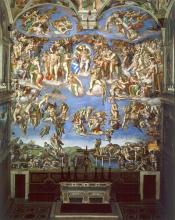
Fifty inmates from a Rome jail were given a private tour of the Vatican Museums on Sept. 13, setting the tone for Pope Francis’ visit to a U.S. prison later this month and emphasizing his concern for people on the margins.
The group from the Rebibbia prison visited the Vatican Gardens and St. Peter’s Basilica, before being given a private tour through the Vatican Museums by Museums Director Antonio Paolucci.
Once the inmates reached the Sistine Chapel, best known for its world-famous Michelangelo’s fresco, the Vatican allowed the prisoners to listen in to the pope’s midday Angelus prayer.

Pope Francis on Sept. 2 told his followers to clamber down from their lofty skyscrapers, reclaim public spaces, and rejoin communities.
Speaking at his weekly public audience at the Vatican, the pope said it was up to families to rejuvenate cities.
There may be a lot of ways to spend one’s free time in a city, but love is missing, Francis said.
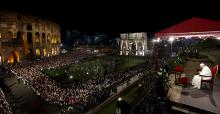
Despite Luther being thrown out of the Catholic Church during his lifetime, the Vatican reacted positively to news of the square’s upcoming inauguration.
“It’s a decision taken by Rome city hall which is favorable to Catholics in that it’s in line with the path of dialogue started with the ecumenical council,” said the Rev. Ciro Benedettini, deputy director of the Vatican press office, referring to a gathering of churchmen to rule on faith matters.
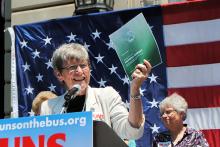
Over the course of two weeks, starting on Sept. 10 in St. Louis, Campbell and nearly a dozen nuns will travel some 2,000 miles through seven states — Missouri, Kansas, Arkansas, Tennessee, Indiana, Ohio, West Virginia — that are marked by sharp political divides.
“The route is not to our base,” she said, contrasting this trip with previous ones that often stopped in cities and towns with communities receptive to the Catholic social justice message.
“We’re going to places where there are differences of opinion, to nourish conversations about the serious work of governance.”

The free English-language Patrum app showcases a selection of works at the Vatican Museums, featuring everything from an Etruscan tomb to 13th-century Chinese scrolls. The brief descriptions are accompanied by other articles detailing daily life at the Vatican Museums. App users are invited to join the conversation through the comment and chat sections.
Art lovers can also tailor their own profiles by picking out their favorite works, allowing them to receive specific updates and chat with others who express interest in the same pieces. While there are other apps that serve as virtual tour guides to Vatican treasures, that is not Patrum’s intent — its layout does not correspond to the museums’ vast network of corridors.
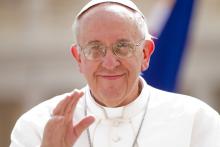
Speaking out on one of the most contentious issues of his papacy, Pope Francis on Aug. 5 issued a powerful call for the church to embrace Catholics who have divorced and remarried, telling a gathering at the Vatican that such couples “are not excommunicated, and they absolutely must not be treated that way!”
“The church is called to be always the open house of the Father … no closed doors! No closed doors!” Francis told the crowd at his weekly public audience, which resumed after a month-long summer break.

A German Catholic diocese wants to take episcopal responsibility to a new level by making its disgraced former “bishop of bling” responsible for the 3.9 million euros ($4.9 million) in losses incurred during the luxury makeover of his residence and office.
Bishop Franz-Peter Tebartz-van Elst earned the “bling” label in 2013 when aides revealed he had spent 31 million euros ($34 million) — over six times the original estimate — on the stately complex opposite the Romanesque cathedral in Limburg, north of Frankfurt.
The Vatican banished him from the diocese several months later and, subsequently, quietly reassigned him to a low-profile post in the Roman Curia. He seemed to be going the way of other failed bishops, such as the few punished in the clerical sexual abuse scandals by being removed from their dioceses

Growing conservative disaffection with Pope Francis appears to be taking a toll on his once teflon-grade popularity in the U.S., with a new Gallup poll showing the pontiff’s favorability rating among all Americans dropping to 59 percent from a 76 percent peak early last year.
Among conservatives the dropoff has been especially sharp: just 45 percent view Francis favorably today as opposed to 72 percent a year ago.
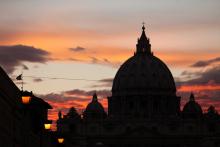
On July 21 and 22, the Vatican hosts two conferences on human trafficking and climate change, bringing the mayors of major cities — including several in the U.S. — to Rome for the events. What do human trafficking and climate change have to do with each other? And what does Catholicism have to do with them? Let us explain.
Q: Why is the Vatican concerned with human trafficking and climate change?
A: If Pope Francis has two pet issues, they are human trafficking and climate change. Since the first year of his papacy he has spoken against human trafficking, calling it “a crime against humanity” and lamenting it as modern slavery. It’s an even bet that when the pope addresses the United Nations in late September he will hammer it as one of the crucial issues of our time. Ditto on climate change. In June, the pontiff published his encyclical — the highest teaching of the church — on climate change.
“Our home is being ruined and that hurts everyone, especially the poorest among us,” Francis said just before the publication of the encyclical.
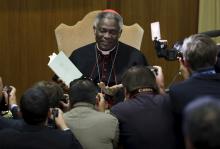
The Vatican is calling on bishops globally to act on the pope’s groundbreaking environmental encyclical, Cardinal Peter Turkson said in an interview.
Last week, bishops’ conferences across the world were sent a message urging them to speak up about the message of the papal letter, which called for greater action on the environment, said Turkson, who is president of the Vatican’s Pontifical Council for Justice and Peace.

The Vatican on June 30 released details of Pope Francis’ itinerary for his Sept. 22-27 U.S. visit, his first, and it shows how this “pope of the people” wants to avoid becoming a prisoner of the East Coast “power corridor” during his five days in Washington, New York, and Philadelphia.
For example, organizers have added visits to a Catholic Charities food program in downtown Washington, a Catholic school in Harlem that serves largely Latino immigrant children, and a prison in Philadelphia to meet with inmates and some of their families.

In an unprecedented move, the Vatican on June 15 announced its former ambassador to the Dominican Republic, Jozef Wesolowski, would stand trial on charges he paid for sex with children.
Wesolowski, 66, who had the title archbishop during his five-year post in Santo Domingo, the Dominican Republic capital, was recalled to the Vatican in 2013. He was later the first person to be arrested inside the Vatican on child abuse charges.
He also faces charges of possessing child pornography during his stay at the Holy See and ahead of his arrest in September 2014, the Vatican said in a statement.
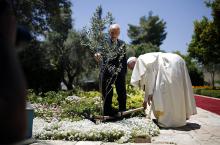
People must change their lifestyles and attitudes to help defeat hunger, Pope Francis said June 11, a hint of what may be coming in his much-anticipated environmental encyclical next week.
“We must begin with our daily lives if we want to change lifestyles, aware that our small gestures can guarantee sustainability and the future of the human family,” said Francis, addressing delegates at a conference hosted by the U.N. Food and Agriculture Organization.
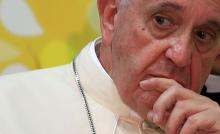
Pope Francis has approved the first-ever system for judging, and possibly deposing, bishops who fail to protect children from abusive clerics, a major step in responding to Catholics who have been furious that guilty priests have been defrocked while bishops have largely escaped punishment.
The five-point plan on accountability for bishops originated with the special sex abuse commission that Francis set up to deal with the ongoing crisis, and after some modifications, his nine–member Council of Cardinals signed off on it and Francis gave his final blessing to it on June 10.

The Vatican has released a new Arabic-language guidebook, the first of its kind, which aims to bring the culture of the Catholic Church to a new audience.
Titled The Vatican, its Significance and its Monuments, the guidebook hit bookstores around the Holy See late last month and goes beyond sightseeing tips.
The book’s author, Edmond Farhat, said he was compelled to write the guide after a lengthy diplomatic career representing the Vatican across North Africa.
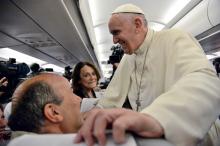
Pope Francis has decried the “filth” of online pornography and warned people against wasting time on their computers.
Speaking aboard the papal plane after his visit on June 6 to Bosnia-Herzegovina’s capital of Sarajevo, the pontiff took a two-pronged approach to modern technology.
“There are two different elements here: method and content,” he said, according to Vatican Radio.
“Regarding the method or way of doing things, there is one that is bad for the soul, and that is being too attached to the computer.”

Pope Francis on June 5 met Chilean President Michelle Bachelet, while outside in St. Peter’s Square anti-abortion protesters drew attention to one of the most controversial topics up for discussion between the two leaders.
The meeting centered around “issues of common interest” such as education and “social peace,” as a Vatican statement put it. But the most contentious topic in play was “the protection of human life,” a nod to the traditionally Catholic country’s strict abortion law, which Bachelet is trying to modify.
Earlier this year, the Chilean leader proposed changes to allow abortions in cases of rape or if a woman’s life was in danger.